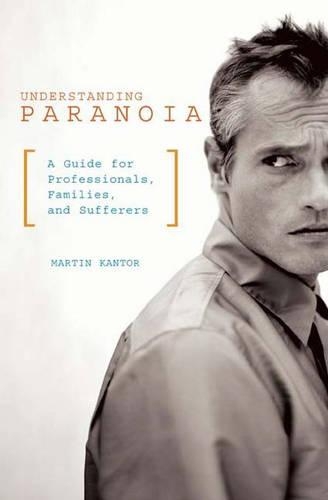
Understanding Paranoia: A Guide for Professionals, Families, and Sufferers
(Hardback)
Available Formats
Publishing Details
Understanding Paranoia: A Guide for Professionals, Families, and Sufferers
By (Author) Martin Kantor MD
Bloomsbury Publishing PLC
Praeger Publishers Inc
30th June 2004
United States
Classifications
Tertiary Education
Non Fiction
Psychology
616.897
Physical Properties
Hardback
272
Description
Dr. Kantor vividly takes us inside the minds of people who are paranoid - experiencing delusions of persecution, from thinking others are "out to get them" to falsely believing they have a physical illness. Kantor also explains to us other facets of the paranoid personality, including suspiciousness, hypersensitivity, extreme vigilance, simmering anger and a tendency to blame others for and absolve oneself of almost everything. How does such paranoia affect each of our lives Whether you are a paranoiac wanting to recover from this emotional disorder, or a person looking for the best way to deal with a paranoid husband, wife, friend, boss or acquaintance, this book offers understanding and guidance. Paranoid individuals are not invariably social misfits. They are to be found in all walks of life and in all professions, suffering from this disorder that distorts behaviour and affects those with whom they come in contact, often in devastating ways. Politicians who engage in negative campaigning, spouses who beat or kill their partners, people in road rage incidents are all among the possibly paranoid, as are students who shoot their schoolmates and teachers or sacked workers who return and shoot their former colleagues. Recognizing and treating paranoid behaviours can prevent or reduce antisocial activity and violence against individuals and society.
Reviews
As a psychological disorder, paranoia is oddly dualistic: psychiatrists and psychologists rely on technical definitions for the mental malady and laypeople have a socially agreed on sense of it. Readers will see both sides well represented here.This volume will be most useful for professionals, though faculty and students will appreciate the rich examples. Recommended. Professionals, general readers, and comprehensive academic collections. * Choice *
Kantor assimilates existing texts and states his own views both firmly and without pretension, an excellent model for teaching and therapy.Nonprofessional readers will gain an understanding of psychodynamic and cognitive-behavioral diagnosis and treatment, along with clarification of various syndromes that mimic or disguise paranoia. Patients, family members, co-workers, and friends will benefit from practical advice illustrated with well-chosen examples. A unique treatment; highly recommended for all psychology collections and larger general libraries. * Library Journal, Starred Review *
^IUnderstanding Paranoia^R is a collection of narrative accounts and therapeutic indications for paranoia. It is a good introduction for people who want information about this disease. It contains excellent descriptions and categorizations of what delusions generally are. It is a profitable psychological and clinical essay for therapists and paranoids themselves. * Metapsychology *
[T]his book is an important and useful work. It may be particularly beneficial to laypersons seeking to understand paranoid behavior and learn more about potential causes and treatments. It will also be helpful for clinicians who are relatively new to working with paranoid individuals.[t]his book is a valuable guide to several aspects of paranoia, and will likely be helpful to many clinicians sufferers, and family members. * The Journal of Nervous and Mental Disease *
Takes the reader inside the minds of people who are paranoid-experiencing delusions of persecution ranging from thinking others are out to get them to falsely believing they have physical illnesses. * Foreword *
Author Bio
Martin Kantor, MD is a Harvard psychiatrist who has been in full private practice in Boston and New York City, and active in residency training programs at several hospitals, including Massachusetts General and Beth Israel in New York. He also served as Assistant Clinical Professor of Psychiatry at Mount Sinai Medical School and as Clinical Assistant Professor of Psychiatry at the University of Medicine and Dentistry of New JerseyNew Jersey Medical School. He is currently a full-time medical author, the author of more than a dozen other books, including Homophobia, Second Edition (Praeger 2009); Uncle Sam's Shame: Inside the Veteran's Administration (Praeger 2008); Lifting the Weight: Understanding Depression in Men: Its Causes and Solutions (Praeger 2007); The Psychopathy of Everyday Life: How Antisocial Personality Disorder Affects All of Us (Praeger, 2006); Understanding Paranoia: A Guide for Professional, Families, and Sufferers (Praeger 2004); Distancing: Avoidant Personality Disorder, Revised and Expanded (Praeger, 2003), Passive-Aggression: A Guide for the Therapist, the Patient, and the Victim (Praeger, 2002), Treating Emotional Disorder in Gay Men (Praeger, 1999), and Homophobia (Praeger, 1998).
